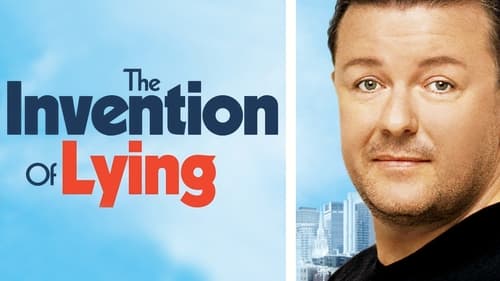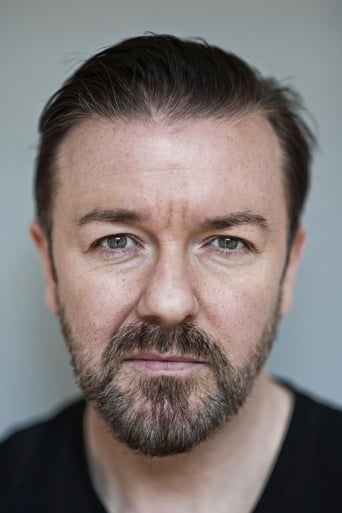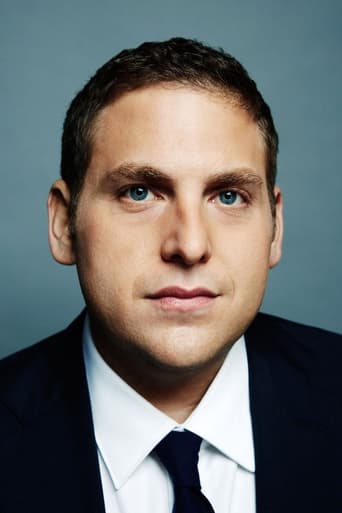Comwayon
A Disappointing Continuation
TaryBiggBall
It was OK. I don't see why everyone loves it so much. It wasn't very smart or deep or well-directed.
Portia Hilton
Blistering performances.
Paynbob
It’s fine. It's literally the definition of a fine movie. You’ve seen it before, you know every beat and outcome before the characters even do. Only question is how much escapism you’re looking for.
studioAT
When did Ricky Gervais stop being funny. Somewhere around the end of 'The Office'? Or was he never really funny to start with? This film certainly proves that he's not the funny, and manages to spread out a very simple one joke idea into a feature length film.If anything it's the supporting cast who come out of this the best. Jennifer Garner, Tina Fey, Rob Lowe - they all manage to get laughs out of a weak script, and play their characters with grace and skill.There's not a lot to recommend this film other than that really, only to say that's it not quite as bad as 'Ghost Town' or Gervais's turn in the 'Muppets Most Wanted'.
bowmanblue
'The Invention of Lying' is, off the bad, one of those films you'll either love or hate. For a start, it stars British comedian Ricky Gervais. And, if you don't know who he is, you're probably best looking at some of his stand-up routines or TV shows on Youtube before you invest your time (or money, if you decide to buy this film!) before watching. Personally, I think he's a comic genius; I love his style of comedy where he plays up his own status and ego, then balances it with poignant pathos. But then he's not for everyone – my Mum snarls every time she comes across a TV show of his, stating the fact that he's too 'full of himself to be likable.' Anyway, 'The Invention of Lying' is set in a – sort of – modern day America, only the population have never told a lie. Now we get into the 'good' and 'bad' points of the film. I like the concept. I think it's good. However, if you think it through too much, you'll start questioning how this can be. And, whatever answer you come with, it doesn't really make sense. In this world, if you think someone is ugly, you tell them to their face. That maybe true (from your point of view), but just because you can't tell a lie doesn't mean you HAVE to say everything out loud.Ricky Gervais plays a down-on-his-luck kind of guy who, by some means (never explained!), learns how to lie. The film charts his natural rise to fame and fortune where everyone believes everything he says.The good points are that it's funny. Every activity he does is nicely executed and shows off what probably would happen in a world where the population lacks the ability to deceive. Then you get to the bad. Jennifer Garner. I have nothing against her. The trouble is that she's not given that much to work with. The film may be clever, but it's little more than a romantic comedy. Therefore, you have the clichéd love interest/plot. Some may say nothing wrong with that, but Jennifer Garner's character is one of the people who can't lie, so many times she comes across as shallow and unlikable when she freely admits that she loves Gervais' on-screen character, but won't marry him simply because he doesn't have good looks or money. Hard to root for a heroine who says things like that! Even in a world without lies most guys would move on if a girl said that to them! Then you have the (so-called) atheist propaganda. This is really where the film divides. Gervais is an outspoken atheist and the film makes it quite clear that the concept on God (or at least the Christian one, in this case) is a 'lie.' A lot of mileage comes from this plot point and it's quite an integral part of the story. Therefore, if you personally don't believe in religion then it probably comes across as funny, whereas if you do believe then this film is basically ninety minutes of someone mocking your beliefs. It's worth checking out some of the online arguments concerning this film before you watch.However, at the end of the day, I stick with my original comments about Gervais being a comic genius. Yes, the some characters may be a bit underdeveloped, the overall concept doesn't quite hold up to scrutiny and the plot little more than a rom-com in disguise, but the film's funny. It made me laugh and as Monty Python's The Life of Brian never offended me, this didn't either.
iatk
A great concept gets buried beneath an antichrist agenda.The movie starts in a great direction. The way it shines a light on the necessity of white lies is actually quite poetic. It intelligently challenges the perspective of right & wrong. Is it right to do something wrong for the right reason?But just as you're preparing yourself for a moral revolution, an elephant walks into the room. Nearly the entire second half of the movie is dedicated to mocking Christianity. The agenda is too obvious; it's beyond comedy. Though it's difficult to peek around the elephant, Jennifer Garner's performance is notable. And if you pretend the first half of the movie is an oddly-ending short film, you might not be as disappointed.
giligara30492
I loved this film for its ideas, its writing, and its characters.THE IDEASIn this film, Ricky Gervais imagines a very simple alternate universe: people have never evolved the ability to lie (or censor themselves). Throughout the story, needlessly said, it becomes much more complicated than that. First, he shows how dishonesty, when one man is capable of it, can be both morally bankrupt (inventing "The Black Plague," the fantastical, literally unbelievable story that makes him famous) as well as morally good (when he lies to the banker to procure a homeless man money), independently of the hugely suggestible nature of everyone else on this film. This immediately has real-world resonance.Second, I admired the clever, satirical, but overall succinct way he dove into the birth of religious faith (in this case contextualised as the Judeo-Christian faith): a grieving man, Mark, who doesn't want his agonising mother to be afraid of death, does a very human thing, which no one in this universe has been capable of doing before. He tells her a lie, invents heaven, for both their comforts. Now, the brilliant bit is that it doesn't feel like satire at all at this point: it feels real. Like this is a very probable hypothesis to explain why the concept of heaven arose. And I must agree with Ricky on this.The invention, of course, goes further. When Mark is pushed into explaining what he knows and how, though (funny how even gullible people seem to need some sort of evidence), he is backed against a wall with the whole of the human race patiently waiting on him, and comes up with "The Man In The Sky" (TMITS). The man who controls everything and both gives people cancer and cures them, capsizes boats and saves the drowning man. If it seems a half-arsed concept, is because, to Ricky, and most atheists like myself, it is. I would imagine the hilarious satire here is clumsy at best in the eyes of a theist, but, really, Ricky does a fantastic job of pinning down both the atheist take on the moral argument (people immediately need guidance on good and bad when faced with the knowledge of TMITS, when they haven't needed it for the whole of human evolution)as well as the problem of evil (TMITS "is kind of a good guy, but he's a prick, too"). In this universe, the rise of churches and diverging doctrines and everything else, of course, is not far off after the initial "discovery" of TMITS. Also funny how Mark creates hell out of basic annoyance at the people pressing him for answers.Finally, I thought another well-put idea of the film is that whilst morality is complex, and people can and do use lies for personal gain and for altruistic purposes, morality is ultimately and foremost, a human construct. Mark, for example, could have easily convinced Anna to get together romantically with him by answering "yes" when she asked him whether being rich and famous would affect the genetic material of their potential offspring. He could have said to Frank, his suicidal neighbour, that he thought him truthfully a loser. But he doesn't. His reaction is "no" to the first, and "killing yourself is a bad idea; let's hang out" to the second. Also, he's intellectually honest in another respect that makes him different from seemingly everyone else in the film: he allows himself to seek out the truth about people in depth, beyond their appearances. And since there is no external morality (TMITS is merely Mark's invention), these moral things he does must be a product of his human empathy, his sense of compassion, his recognition of sentience outside ourselves deserving of respect. It's a human construct.THE WRITINGNot much to say here. Ricky's smart-arse wit was there throughout. The callousness and hilarity of the truths and the absurdity of the lies was very well done.THE CHARACTERSMark Bellison (Ricky Gervais) is a mercilessly advantageous, cunning bastard who's also kind and compassionate. I like him. Anna McDoogles (Jennifer Garner) is a superficial girl who grows throughout the film by getting to see beyond appearances. She ends up giving Mark a chance and finding out that she does like him for him after all. I liked their relationship, too.I suggest watching if you like wit, satire, and thoughtful comedy. It could have been nonsense, but Ricky's way too smart for that -- he made it mean so much more than its premise. A testament to the effectiveness of simplicity.







